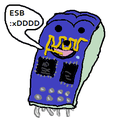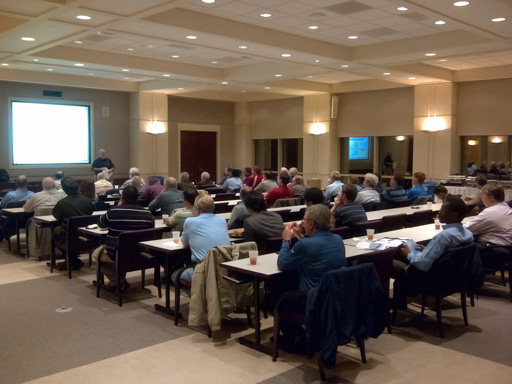
 I will be talking about PCB fab in the next viddeo. I will try and work in some of these questions into that
I will be talking about PCB fab in the next viddeo. I will try and work in some of these questions into that
 Thanks everyone!
Thanks everyone!
 @frank Give me an hour with ya and I could have ya doing Gig stuff!
@frank Give me an hour with ya and I could have ya doing Gig stuff!
 I'm just a programmer, tinkering a bit with hardware :-)
I'm just a programmer, tinkering a bit with hardware :-)
 Didn't wanna interrupt earlier with an off-topic question... but hopefully ok now to ask if anyone's done a PCB design using 0.4 mm pitch BGA? I'm considering one soon (a 36 pin BGA). Any tips?
Didn't wanna interrupt earlier with an off-topic question... but hopefully ok now to ask if anyone's done a PCB design using 0.4 mm pitch BGA? I'm considering one soon (a 36 pin BGA). Any tips?
 Just to add, the stuff we did on 2 sided boards in the 80's was just awful, I would use 40-80 series resistors in a design
Just to add, the stuff we did on 2 sided boards in the 80's was just awful, I would use 40-80 series resistors in a design
 @Paul Stoffregen Are you doing it yourself? What CAD package?
@Paul Stoffregen Are you doing it yourself? What CAD package?
 Yup. I'm a bit embarrassed to admit it, but I use an ancient version of PADS. It still works pretty well for me.
Yup. I'm a bit embarrassed to admit it, but I use an ancient version of PADS. It still works pretty well for me.
 @Frank Buss you know this stuff. You were asking the right questions in that other forum on FB. ;)
@Frank Buss you know this stuff. You were asking the right questions in that other forum on FB. ;)
 @Paul Stoffregen 0.4mm pitch - you will have to use Via-In-Pad HDI
@Paul Stoffregen 0.4mm pitch - you will have to use Via-In-Pad HDI
 PADs is one of the progenitors of the industry.
PADs is one of the progenitors of the industry.
 I have a reference design I can send you with a freescale I.MX8 CPU if you like?
I have a reference design I can send you with a freescale I.MX8 CPU if you like?
 I guess that means I need to learn how to buy a PCB with via-in-pad... never done that befer
I guess that means I need to learn how to buy a PCB with via-in-pad... never done that befer
 *before
*before
 @Ben Jordan I would love a copy if you could email me at bilherd@hackaday dot com
@Ben Jordan I would love a copy if you could email me at bilherd@hackaday dot com
 will do
will do
 @Paul Stoffregen you might be able to use thin traces which is slightly cheaper.
@Paul Stoffregen you might be able to use thin traces which is slightly cheaper.
 I've never had a manufacturer complain about via-in-pad, and I don't take any special steps to warn them or anything
I've never had a manufacturer complain about via-in-pad, and I don't take any special steps to warn them or anything

Hack Chat Transcript, Part 1 | Details | Hackaday.io
Well, we've been having some good sidebar discussion here for a bit, but let's kick it off officially and welcome Bil Herd to the Hack Chat. Today we're going to learn about high-speed PCB design. Bil, I usually ask hosts to introduce themselves to get things going, but that seems silly here.
 so you give them more than one drill file?
so you give them more than one drill file?
 generally they know how to do it these days...
generally they know how to do it these days...
 I know someone that is as dedicated to PCB layout as I am to hardware. I run questions like .4mm by him in the form of "yes buyt what works in production?"
I know someone that is as dedicated to PCB layout as I am to hardware. I run questions like .4mm by him in the form of "yes buyt what works in production?"
 no, are you referring to via-in-pad with filling or something?
no, are you referring to via-in-pad with filling or something?
 yes different drill files for each drill layer pair will be needed
yes different drill files for each drill layer pair will be needed
 We were talking earlier about via in pad and sealing them and hot gasses
We were talking earlier about via in pad and sealing them and hot gasses
 yeah if it's hdi, fabs will often plate them up to solid copper - no outgassing problems there
yeah if it's hdi, fabs will often plate them up to solid copper - no outgassing problems there
 ballpark figures may be obtained by US based fabs
ballpark figures may be obtained by US based fabs
 I just read "The Designer's HANDBOOK for DFM" by Sierra Circuits, (DFM is design for manufacturing), I recommend it
I just read "The Designer's HANDBOOK for DFM" by Sierra Circuits, (DFM is design for manufacturing), I recommend it
 was going to mentione Sierra!
was going to mentione Sierra!
 @Bil Herd do you mean this?
@Bil Herd do you mean this?
https://www.facebook.com/groups/CommanderX16/permalink/524160045001761/?comment_id=524251758325923&reply_comment_id=524333631651069
I think they will get into trouble, when they try to access the YM2151 with an 8 MHz clocked X16, it just works by chance now. But at least they can switch it to 4 MHz, but I think a latch to make the signal and data longer would be better.
 I am looking for the link, a good read for 80 pages... of course I printed it rather than read it online
I am looking for the link, a good read for 80 pages... of course I printed it rather than read it online
 @Frank Buss ;)
@Frank Buss ;)
 What website do you recommend to ask specific question about high speed/RF magic in PCB designs?
What website do you recommend to ask specific question about high speed/RF magic in PCB designs?
 Check out the Signal Integrity Journal , give me a sec and I will pull links.
Check out the Signal Integrity Journal , give me a sec and I will pull links.
 looks like there are other things they do by trial and error, like using a TL084 with just +5V / 0V. The designer said it works stable with a big enough capacitor :-)
looks like there are other things they do by trial and error, like using a TL084 with just +5V / 0V. The designer said it works stable with a big enough capacitor :-)

DFM_handbook_digital.pdf
1 MB
 See if that pdf is readable.\
See if that pdf is readable.\
 yup, got it, 77 pages :)
yup, got it, 77 pages :)
 @Frank Buss ;)
@Frank Buss ;)
![]() because you said i was talking about differential pairs, i actually wasn't it just got recommended to me to keep all datalines at the same length because the protocoll is counting on them to arrive at the same time, so does that not actually matter?
because you said i was talking about differential pairs, i actually wasn't it just got recommended to me to keep all datalines at the same length because the protocoll is counting on them to arrive at the same time, so does that not actually matter?

Teledyne LeCroy SI Academy
Learn signal integrity problem solving skills from the Signal Integrity Evangelist, Dr. Eric Bogatin. Did you miss one of Eric's popular live classes? At the Teledyne LeCroy Signal Integrity Academy, you can explore all his past classes and many new ones, broken down into short, concise, video lessons.
 I remember an older engineer telling me about how he used hex inverter chips as opamps, quite interesting
I remember an older engineer telling me about how he used hex inverter chips as opamps, quite interesting
 @aerispalm not NEAR as critical as we used to say, in fact I have changed my viewpoint a little.
@aerispalm not NEAR as critical as we used to say, in fact I have changed my viewpoint a little.
 If you are off by half an inch at 2/3rds the speed of ligh you are still pretty darn close
If you are off by half an inch at 2/3rds the speed of ligh you are still pretty darn close
 light
light
 a signal propagates 6" in a ns on a standard PCB
a signal propagates 6" in a ns on a standard PCB
 its like square corners, which we didn't get to, it goes by so dang fast that it gets lost in a rounding error
its like square corners, which we didn't get to, it goes by so dang fast that it gets lost in a rounding error
 @Adam Oakley how does this work? an inverter gate has only one input
@Adam Oakley how does this work? an inverter gate has only one input

https://speedingedge.com/products/right-first-time/
Right the First Time, A Practical Handbook on High-Speed PCB and System Design
"Right the First Time, A Practical Handbook on High Speed PCB and System Design, Volume 1," is the premier publication of Speeding Edge. It was written by Speeding Edge founder and president, Lee W. Ritchey, co-authored by John Zasio, an recognized industry expert in high-speed design, and edited by Kella J.
 Whoops that was meant to be a link to Lee's site, not an ad for his book
Whoops that was meant to be a link to Lee's site, not an ad for his book
 I wish I had asked more about that, something about biasing it in a certain way to use it as an amplifier
I wish I had asked more about that, something about biasing it in a certain way to use it as an amplifier

https://www.signalintegrityjournal.com/
Home Page
Signal Integrity Journal, a sister publication to Microwave Journal, covers signal integrity, power integrity and EMC/EMI related topics with industry news, technical articles, white papers, products, Buyer's Guide, webinars, videos and more. The vision for the SI Journal is to increase the signal to noise ratio for SI, PI and EMC engineers by providing high value content.
Read this on Signalintegrityjournal
 We have changed what we thought we knew about decoupling caps, now we get caught in the anti-resonance of teh caop since caps are also.... wait for it... Inductors
We have changed what we thought we knew about decoupling caps, now we get caught in the anti-resonance of teh caop since caps are also.... wait for it... Inductors
 "the decoupling cap"
"the decoupling cap"
 https://wiki.analog.com/university/courses/electronics/electronics-lab-20 here's an article about the hex inverter amplifier
https://wiki.analog.com/university/courses/electronics/electronics-lab-20 here's an article about the hex inverter amplifier
![]() Interesting. I'll look into it.
Interesting. I'll look into it.
 thanks, looks like an interesting hack :-)
thanks, looks like an interesting hack :-)
 I used to bias the 4000 series CMOS inverters into amps. I made an ultrasonic blind spot detector in the 80's that fit in a running light using ahex invertors as analog amps
I used to bias the 4000 series CMOS inverters into amps. I made an ultrasonic blind spot detector in the 80's that fit in a running light using ahex invertors as analog amps
 Lutetium
Lutetium


Discussions
Become a Hackaday.io Member
Create an account to leave a comment. Already have an account? Log In.